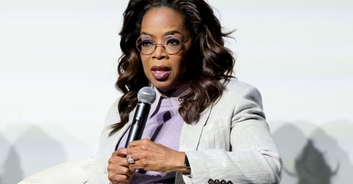What's the next big thing in medicine?
If you ask Gwyneth Paltrow, it's psychedelics. When the healthy-living guru was recently interviewed by The New York Times, she had some intriguing ideas about the future.
While drugs like these are, at the moment, more likely to be associated with hippies and the counterculture of the 1960s than doctors, the Iron Man actress thinks that's all about to change.

When asked by the New York Times what the mainstream will be looking at in the months to come, she replied: "I think how psychedelics affect health and mental health and addiction will come more into the mainstream. I mean there’s undeniably some link between being in that state and being connected to some other universal cosmic something."
However, despite her belief that psychedelics will be popular with concerns to health soon, the actress has never actually tried them, stating that she is "terrified" of doing so.
When it was pointed out by the interviewer that it "changes your mind. It changes the way you think," she replied: "Yeah, and how do we do that as a culture? How do we evolve? What is the next iteration of the culture as it pertains to the way we think about things, the degree of openness to which we think about things and process things? What about ibogaine, that shrub from Gabon?"
While it's yet to be definitively proven that mind-altering drugs have the potential to be mind-healing, a number of small studies have claimed that psychedelics show promise in treating mental health disorders like depression, addiction and post-traumatic stress disorder.
This month, a study in rats suggested microdosing can provide relief for symptoms of depression and anxiety - but, published in Science Daily, it also showed potential negative effects like significantly increased bodyweight in male rats, for example, and neuronal atrophy in female rats.
It remains to be seen whether Gwynnie will be right or wrong - however, one thing is for sure: in the meantime, the 46-year-old is extremely busy being the CEO of Goop, a natural health company launched in 2008 which provides new age tips on health and wellness.
In the New York Times interview, she spoke of having to "unlearn" and "relearn" parts of the job, stating: "When you’re in the family stage and your company has just nine people or whatever, it’s much different than trying to manage and maintain a culture of 250 people. I have no experience at this. It’s almost like I have to unlearn things, relearn things, start over."
She also opened up about attempting to put some "masculinity" in her start-up, saying: "When a start-up starts, it’s full of feminine energy, even if it’s an all male start-up. Right? Because it’s collaborative, it’s emotional, it’s passionate, it’s instinctual. Those are all feminine qualities. And then as it scales, you have to put some rules in place. And so that’s where the masculine comes in.
"And you have compliance and H.R. and all these things that are putting structure to the business, which is super important. So unlearning some of the old kind of feminine ways, trying to apply the right kind of masculinity, and seeing if it’s possible to really still lead from that feminine place, is what I think about."
In 2017, consumer advocacy group Truth in Advertising filed a complaint with the government regulatory agency regarding over 50 health claims made by Goop they claimed were "dangerous and false". In September 2018, Goop settled a $145,000 lawsuit with Californian prosecutors on Tuesday over the advertising of a vaginal detox egg - found not to be based on science.
If you're curious to find out more about Gwyneth's project, visit the Goop website.



.jpg_sbl4of?tr=h-184)
